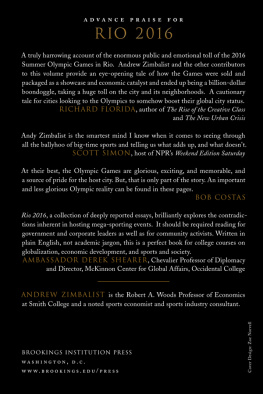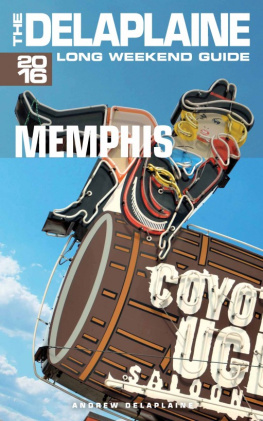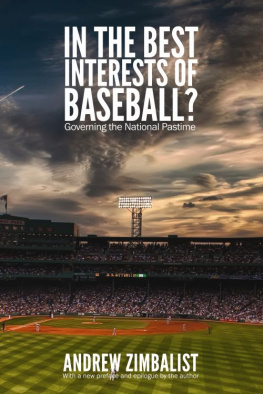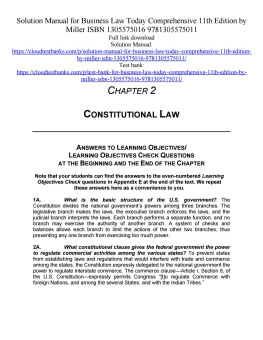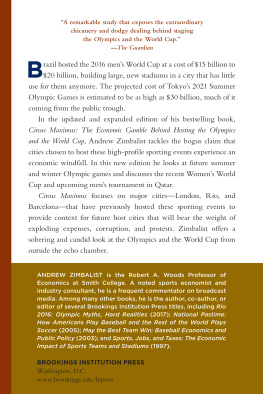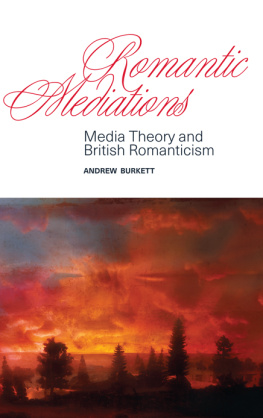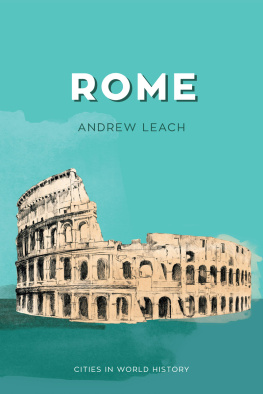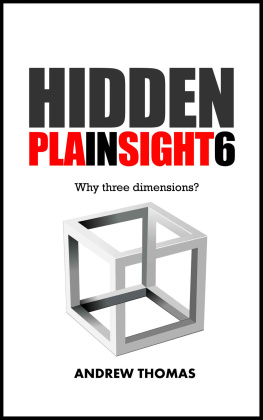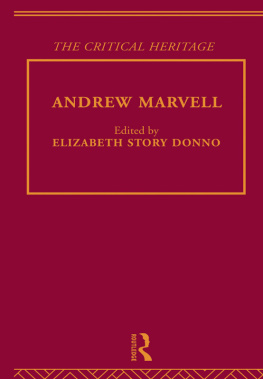Zimbalist Andrew - Rio 2016
Here you can read online Zimbalist Andrew - Rio 2016 full text of the book (entire story) in english for free. Download pdf and epub, get meaning, cover and reviews about this ebook. publisher: Brookings Institution Press, genre: Politics. Description of the work, (preface) as well as reviews are available. Best literature library LitArk.com created for fans of good reading and offers a wide selection of genres:
Romance novel
Science fiction
Adventure
Detective
Science
History
Home and family
Prose
Art
Politics
Computer
Non-fiction
Religion
Business
Children
Humor
Choose a favorite category and find really read worthwhile books. Enjoy immersion in the world of imagination, feel the emotions of the characters or learn something new for yourself, make an fascinating discovery.
- Book:Rio 2016
- Author:
- Publisher:Brookings Institution Press
- Genre:
- Rating:3 / 5
- Favourites:Add to favourites
- Your mark:
- 60
- 1
- 2
- 3
- 4
- 5
Rio 2016: summary, description and annotation
We offer to read an annotation, description, summary or preface (depends on what the author of the book "Rio 2016" wrote himself). If you haven't found the necessary information about the book — write in the comments, we will try to find it.
Rio 2016 — read online for free the complete book (whole text) full work
Below is the text of the book, divided by pages. System saving the place of the last page read, allows you to conveniently read the book "Rio 2016" online for free, without having to search again every time where you left off. Put a bookmark, and you can go to the page where you finished reading at any time.
Font size:
Interval:
Bookmark:
RIO 2016
OLYMPIC MYTHS, HARD REALITIES
ANDREW ZIMBALIST
EDITOR
BROOKINGS INSTITUTION PRESS
Washington, D.C.
Copyright 2017
THE BROOKINGS INSTITUTION
1775 Massachusetts Avenue, N.W., Washington, D.C. 20036
www.brookings.edu
All rights reserved. No part of this publication may be reproduced or transmitted in any form or by any means without permission in writing from the Brookings Institution Press.
The Brookings Institution is a private nonprofit organization devoted to research, education, and publication on important issues of domestic and foreign policy. Its principal purpose is to bring the highest quality independent research and analysis to bear on current and emerging policy problems. Interpretations or conclusions in Brookings publications should be understood to be solely those of the authors.
Library of Congress Cataloging-in-Publication data are available.
ISBN 978-0-8157-3245-7 (pbk. : alk. paper)
ISBN 978-0-8157-3246-4 (ebook)
9 8 7 6 5 4 3 2 1
Typeset in Sabon Roman
Composition by Westchester Publishing Services
Contents
ANDREW ZIMBALIST
JULES BOYKOFF
JULIANA BARBASSA
THERESA WILLIAMSON
RENATA LATUF DE OLIVEIRA SANCHEZ AND STEPHEN ESSEX
JAMIL CHADE
JULIANA BARBASSA
JULES BOYKOFF
ANDREW ZIMBALIST
Acknowledgments
The authors would like to thank Nashwa Al-sharki, Allison Stewart, Rodrigo Capelo Nunes, Kaia Sand, Jessi Wahnetah, Gilmar Mascarenhas, Orlando Santos Junior, Christopher Gaffney, Larissa Lacerda, Renata Neder, Andrea Florence, the Fulbright Scholar Program, Pacific University, Smith College, and the remarkable people at Catalytic Communities in Rio de Janeiro. We would like to thank cariocasthe residents of Riofor their grace and patience with our questions and those affiliated with the Economic Geography group of the University of Zurich for their support, friendship, and a room with a view during a crucial year of research and writing.
Introduction
Welcome to Hell
ANDREW ZIMBALIST
Rio de Janeiros hosting the 2016 Summer Olympic Games was to be the crowning achievement of three decades of democracy and economic development. Rio and Brazil would enter the first world, Rios favelas would be modernized, its violent drug gangs rooted out, its sports and transportation infrastructure enhanced, and the city and country would share its good fortunes on the world stage. Reality, however, impinged on what was to have been and played a cruel trick on Rio and Brazil.
Olympics development magic doesnt even work for developed cities.Games, the host city finds itself with less available land (Beijing dedicated 8,400 acres of real estate to hosting in 2008), more venues of limited use to maintain, environmental degradation, social dislocation, mountains of financial debt, and, generally, a modicum of additional infrastructure, some of which is useful to the citys development but most of which is of low priority.
After each Olympics and the disappointing economic outcome, the IOC puts its well-oiled propaganda machine to work. Try as it does, the IOC public relations effort lately has had little success. City after city is losing interest in hosting the three-week Olympics extravaganza: five European cities dropped out of the competition to host the 2022 Winter Games, and Boston, Budapest, Hamburg, and Rome decided not to go forward with their candidacies to host the 2024 Summer Games. Tokyo won the right to host the 2020 Summer Olympics with a bid of $7.1 billion, but a September 2016 report commissioned by the city of Tokyo projected costs of $30 billion. The IOC could not withstand more bad news, especially after the Rio 2016 experience, and its vice president, John Coates, made this clear, stating that Tokyos high costs could scare off cities considering bids for future Olympics. The IOCs concern was its bidding process, not Tokyos fiscal mess.
It took the International Olympic Committee three months to come up with its definitive characterization of the Rio Summer Games: the most perfect imperfect Games, declared IOC spokesperson Mark Adams in early December 2016. Its a catchy turn of phrase (albeit grammatically flawed); if we only knew what it meant. Does it mean that the Games were perfectly imperfectthe epitome of imperfection? Or imperfectly perfectalmost perfect? Or is it just obfuscation?
One thing is clear. When the Games ended on August 22, 2016, the IOC breathed a deep sigh of relief and then bid farewell to Rio. To the IOC, Rio now became little more than a historical artifact and an object of spin.
The lead-up to Rio 2016 was harrowing for the IOC. Everything was going wrong and there was legitimate concern that the Games would be disastrous, perhaps Mexico 1968, Munich 1972, and Montreal 1976 all rolled into one. Consider the litany of troubling news emanating from Rio in the months leading up to August 5, 2016.
Rios state government announced that eighty-four people were killed by police in May, a 91 percent increase from a year earlier. Street muggings were up 43 percent during the five months of 2016, with 9,968 cases in May alone. That number rose to a record 10,701 muggings on the streets of Rio in July.
Second, corruption, long a constant in Brazilian politics, began to spin out of control. The oil bonanza and the massive construction projects, many of them connected to hosting the World Cup and the Olympics, were simply too much opportunity for gain for Brazilian politicians and construction companies to forego. Brazils hosting of the World Cup and Olympics created a wide window for the world to watch the countrys biggest corruption scandal (Lava Jato, or Car Wash), along with the graft of World Cup and Olympics contracting, campaign financing, and more. (These scandals are discussed at length in Barbassas chapter, Brazils Olympic Rollercoaster.)
Most notorious perhaps, less than three months before the 2016 Games began, a gang of venal politicians alleged that President Dilma Rousseff was guilty of manipulating the countrys budget for political ends. The allegations were never proven, but Rousseff was suspended from office on May 12 and then removed permanently after the Games were over. The impeachment gambits true purpose was to distract Brazilians from the wider rings of corruption that had infiltrated the government and to prepare for a congressional clemency vote for compromised politicians.
Understandably, the breakdown of services, the revelation of vast corruption, the extensive layoffs and failure to pay workers, the growing violence, and the waste of Olympics spending provoked widespread and militant political protest. Perhaps most visible to the outside world was the protest staged by police and firefighters just five weeks before the opening ceremonies at Rios International airport, warning visitors that the city was not safe, with one large sign stating Welcome to Hell. The police, firefighters, and other public workers threatened to go on strike during the Olympic Games.
Amid this social, economic, and political turmoil, the Rio Organizing Committee for the Olympic Games (ROCOG) was scrambling to prepare the city for the event. And not everything was going so well. It was unclear if the new Line 4 metro to Barra da Tijuca would be functional or if many of the competition and related venues would be ready. ROCOG had run out of money. In July 2016 the Rio city government allocated an extra $46 million to help with last-minute preparations, and following a declaration of a state of calamity by the state governor, a further $890 million was committed by the federal government in emergency aid to help complete the Line 4 metro and provide Games-related security, including the payment of wages to police to patrol the streets. The sports venues were supposed to have test events. Many didnt. Some that did failed. Power supply to all venues was in question. ROCOG announced that many venues with temporary seating would have significant reductions in capacity. Meanwhile, the temporary seating in some arenas was not stress tested before the competition. Only 15 percent of the planned promotional, decorative, and directional signage was installed. Construction was rushed and, in many places, shoddy. As athletes arrived at their village days before the competition began, they found lodging with dysfunctional plumbing and electricity. Some teams were forced to relocate temporarily and the Australian team refused to move in. There were ten reported construction-related deaths.
Next pageFont size:
Interval:
Bookmark:
Similar books «Rio 2016»
Look at similar books to Rio 2016. We have selected literature similar in name and meaning in the hope of providing readers with more options to find new, interesting, not yet read works.
Discussion, reviews of the book Rio 2016 and just readers' own opinions. Leave your comments, write what you think about the work, its meaning or the main characters. Specify what exactly you liked and what you didn't like, and why you think so.

